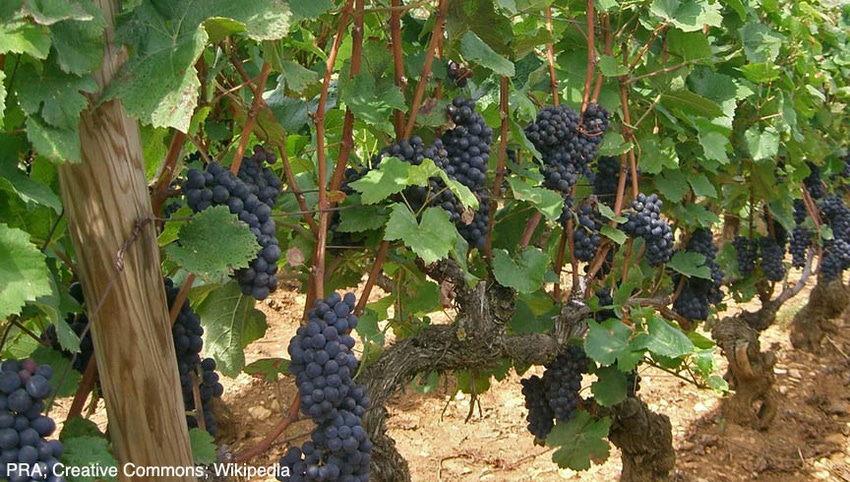August 19, 2013

The world’s wine grape vines are dying — falling domino style to the inexorable spread of bug or bacteria or unknown disease agent.
Not true of course — there is no wine grape apocalypse. But what if there were a disease agent sweeping plague-style across the vine world?
Mitch Frank has written a razor sharp column at Wine Spectator: How Would You Stop a Vineyard Apocalypse? He references greening disease, the scourge of the citrus industry, and the possibility of genetically modified fruit as a solution. If a GM orange proves viable, how will the public react to GM orange juice on the breakfast table?
Frank extends the question to wine. “Would I drink wine from a genetically modified vine? GMOs are controversial, and wine has not been spared. In 2010, activists tore apart an experimental vineyard in Alsace, destroying 70 vines modified to resist fanleaf virus, a widespread affliction in Burgundy and Champagne.”
The Alsace incident was the standard storming of a GM field. An over-the-top assault on a fenced GM test plot in which about 60 protestors, under cover of night, destroyed 70 vines planted to withstand grapevine fanleaf virus — of which there is still no cure today. (Ripping up GM crops is standard fare for GM opponents — the latest example took place Aug. 8, as 400 activists took just 15 minutes to uproot 1,000 square meters of Golden rice at a test plot in the Philippines that was weeks away from evaluation. A daily bowl can provide over half of recommended Vitamin A intake. Golden rice, despite offering a potential lifeline to several million children that die or go blind every year from Vitamin A deficiency, has become a crusade for anti-GMO campaigners.)
Forget standard GM crops (corn and soybeans) — the GM question is just around the corner for crops that have direct appeal to consumers in the aisle: apples, bananas, lettuce, plums, and more. Frank rolls out the question for grapes: “We don't pick oranges from wild trees or crush grapes from wild vines. We cultivate them. For better or worse, our work has produced corn and oranges and grapes extremely different from what nature would have produced on its own. Would GMO vines be vastly different than the vines we have produced by spending centuries selecting our favorite vines, cutting off branches and propagating them? Man has fundamentally shaped the evolution of the Vitis vinifera we treasure today … What if a GMO vine saved wine from extinction?”
A pressing question
Frank’s last question regarding extinction is pressing. He references the phylloxera wine grape battle that was lost and won over 100 years ago in France. Arriving in France via a case of American vines from New York in 1862, phylloxera, a wine grape assassin, was unleashed in France’s vineyards and delivered a wine grape holocaust. The tiny creature bred with freakish speed, disrupting root function and opening the door for a host of secondary fungal pathogens — almost wiping out the French wine industry from 1860-1900. By 1884, growers had been forced to destroy 2.5 million vineyard acres. The end-times tale, filled with champions and charlatans, saw blame and solutions thrown together in a pell-mell panic (divine judgement, urine baths, iron contamination, volcanic ash applications, and scores more).
After decades of building futility, a solution was found: American rootstock, which had escorted phylloxera into France, was resistant to the aphid-like pest. Grafting of U.S. phylloxera-resistant rootstock to French vines put an end to the wine blight. The poison was the cure.
Frank closes with a fitting question: “If a modern-day phylloxera emerged, and nothing else worked, shouldn’t GMOs be an option?”
(See here for Mitch Frank's complete column.)
Follow me on Twitter: @CBennett71
Blog archive
Moonshining loses the bootlegger label
Water the commodity gold of 21st century?
Vile dog meat markets still thriving in China
Bull market, bitter legacy for opium farmers
Buffalo bone fertilizer — forgotten days of agriculture
Agriculture waiting on Silicon Valley moment
Brad Kelley, the farm boy with 1 million acres
Meteorite find a golden harvest for farmer
Wild dog plague crushing livestock industry
Days of wine auctions and gay marriage
Cliff Young — the farmer who outran the field
You May Also Like




